Wrinkles
There are books and movies that I hate but recommend to everybody. They are good books and movies—and often times are even great books and movies. I recommend them because they are good or great. I am able to recognize their nearness to whatever we might be tempted to describe as objective quality. They are well-composed and well-accomplished. Their artistry is evident and clear. And more than that, they speak to some integral aspect of the human condition. They, through craft and talent and effort and grace, say something to the alert reader—and often, something valuable to the proposal of How should we then live?
I recommend these books and movies often and without hesitation. Because it is right to do so. And yet these books and movies I'm talking about: I hate them. Because ignorance is blissful. Because I have a heart. Because I am empathetic. Because I am tuned in to our existence and its fragilities. Because I am not immune to horror or terror. Because the metaphorical nights are long and they threaten always the metaphorical days. Because I too, like many of you, can be undone by simple stories told well.
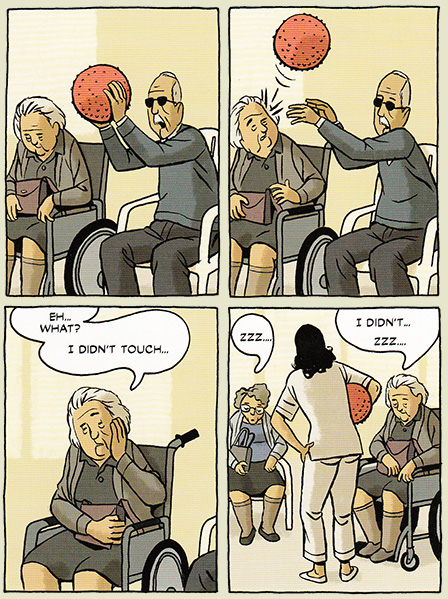 Boing!
Boing!
One of the great glories of the comics medium (and one that is continually being probed and explored) is its ability to propose a visual-narrative reflection of psychological phenomena. Dreams, visions, thoughts, emotives. This has been especially useful in comics' navigation of mental disorders.11EXAMPLES:
Glyn Dillon's Nao of Brown: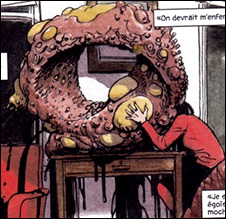
David B's Epileptic: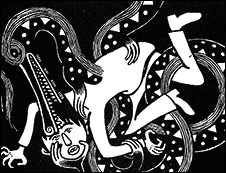
Joe Kelly's I Kill Giants: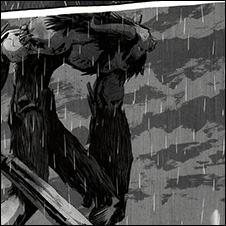 Comics offer all the toolbox of a relentless CGI but married to a character-driven Dogme 95 production. Comics can do anything and that paves the way to a complex psychological narrative—one that unveils effortlessly to the reader.
Comics offer all the toolbox of a relentless CGI but married to a character-driven Dogme 95 production. Comics can do anything and that paves the way to a complex psychological narrative—one that unveils effortlessly to the reader.
Meaning that: authors can vividly convey states of being and mind that would be otherwise difficult or costly in other media. And Paco Roca uses this gift of the medium to wring out the experiential nature of the elderly in a home for those gradually giving in to the disenfranchisement of the mind—suffering through troubles as benign as simple senility or as aggressive as Alzheimer's. He does a fantastic job conveying lives surrendered to permanent convalescence. He does such a good job, in fact, that I hate Wrinkles. I hate it because it is so good and you should definitely read it.
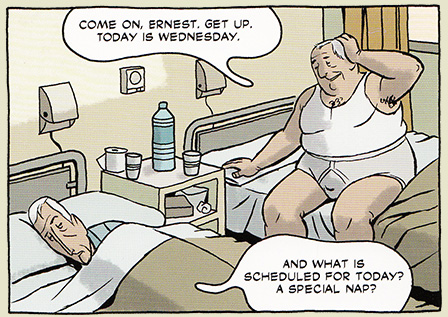
When I was younger, say twenty-one or so, my brother read me an account of an unpopular man in the 1600s who had been driven from a town while being pelted with stones. As a result of the injuries to the man's head, his personality, character, and beliefs changed. He was unmade and remade because of a bad afternoon. Years later, he reverted again to his former self, but for me the damage was well accomplished. Before I had kids,22Now that I have children whom I cherish, there are any number of terrors that stalk the corners of my waking existence. Death, cancer, bullies, leukemia, pedophiles, them growing up to not like me. my only real fear in life was losing who I was to some catastrophe like brain injury—or to one of the many handfuls of maladies that assault those of old age. Cognition, the particular way that I perceive the world, who I am: those are the essentialities to my existence. After all, if I am not me then who on earth am I?
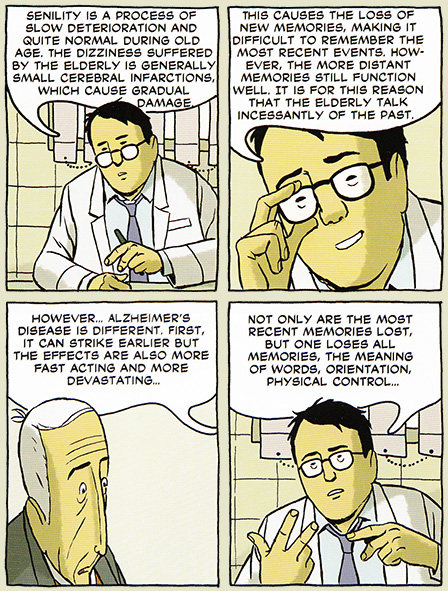
In Wrinkles, Paco Roca underlines, circles, highlights, and writes in the margins of my fear. His protagonist, Ernest, is an older gentleman (a former bank branch manager) who suffers from Alzheimer's (though he rarely seems cognizant of his own suffering). The text begins with his admission to an assisted care facility equipped to interact with tenants of varying degrees of dementia. Ernest's case, when compared with some of the other guests, seems almost benign. Ernest will live out the remainder of his days here, a life mediated through the fog of medications.
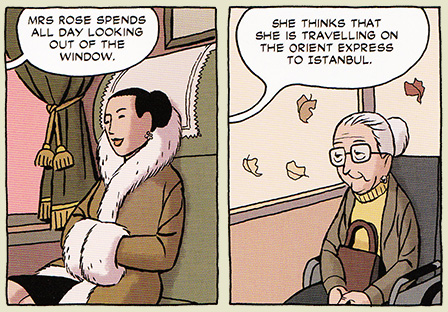
Roca uses the toolset of comics to seamlessly transport guests of the home into the world as they are experiencing it. In one moment a man is seventy-two and standing alone in a foyer, and in the next he is six and is stood up awkwardly before a room of his new classmates. A woman is pictured, seated by the window in her wheel chair, old and haggard; in the prior panel she is a young woman of beauty and elegance, riding the window seat of the Orient Express. Another resident sees members of the Legion everywhere. Another is transported again and again to the moment when he secured the heart of the love of his life.
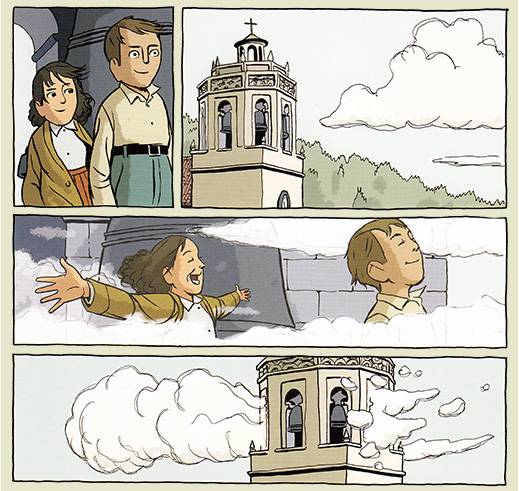 This is excerpted from one of the the happiest, most sublime, most tragic moments in the book.
This is excerpted from one of the the happiest, most sublime, most tragic moments in the book.
It made my heart soar and drown simultaneously.
The drama of daily living with a fading mind is told with humour and verve and a lightness of being. And I found myself growing more and more anxious. These amusing anecdotes and funny bits and pieces of lives gone askew were toying with my deepest and tremblingest insecurities. On the surface I was enjoying Roca's book and the story of Ernest's progressive psychological collapse. It's bright and colourful and lovely and well-illustrated and well-paced.33Though in what may approach a caveat, I will warn that this story about elderly residents in a home, like all stories about elderly residents in a home, includes the obligatory escape-from-the-home-and-joyride-awhile trope. It was the only moment for me that skirted being a false note. But really, if you're in a home waiting to die, I'd guess that this sort of thing probably actually happens not infrequently so I gave it a pass. But in the midst of my enjoyment, the terror of existence roiled and rumbled. By the end, I was panicked and undone. Roca had done so good a job of exploring the gradual dissolution of selves that I was entirely exposed, my oldest fear made raw and calamitous—all within one hundred pages in which nothing incredibly terrible happens save for that a handful of people gradually forget themselves.
And that's the magic of story.
Good Ok Bad features reviews of comics, graphic novels, manga, et cetera using a rare and auspicious three-star rating system. Point systems are notoriously fiddly, so here it's been pared down to three simple possibilities:
3 Stars = Good
2 Stars = Ok
1 Star = Bad
I am Seth T. Hahne and these are my reviews.
Browse Reviews By
Other Features
- Best Books of the Year:
- Top 50 of 2024
- Top 50 of 2023
- Top 100 of 2020-22
- Top 75 of 2019
- Top 50 of 2018
- Top 75 of 2017
- Top 75 of 2016
- Top 75 of 2015
- Top 75 of 2014
- Top 35 of 2013
- Top 25 of 2012
- Top 10 of 2011
- Popular Sections:
- All-Time Top 500
- All the Boardgames I've Played
- All the Anime Series I've Seen
- All the Animated Films I've Seen
- Top 75 by Female Creators
- Kids Recommendations
- What I Read: A Reading Log
- Other Features:
- Bookclub Study Guides










